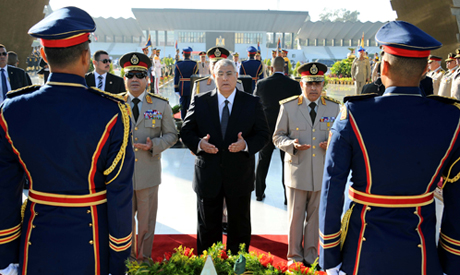 In his first interview to the foreign press, Egypt's interim President Adly Mansour affirmed to the pan-Arab daily Al-Sharq Al-Awsat on Sunday American and European Union support of the country's political roadmap, which will see the new constitution adopted in a month "at the latest," followed by parliamentary, then presidential elections.
In his first interview to the foreign press, Egypt's interim President Adly Mansour affirmed to the pan-Arab daily Al-Sharq Al-Awsat on Sunday American and European Union support of the country's political roadmap, which will see the new constitution adopted in a month "at the latest," followed by parliamentary, then presidential elections.
A handful of political forces have been calling for a presidential vote to come first, until the country's suspended constitution is redrafted and a new electoral law is brought in place to govern the parliamentary elections.
President Adly Mansour asserted however that no alterations would be made to the political plan drawn following the overthrow of former Islamist president Mohamed Morsi: first a constitution, immediately followed by parliamentary elections to conclude two months later, and a presidential vote to begin two or three months after that.
Mansour affirmed the European Union's support of the transitional plan, adding that the bloc's Foreign Policy Chief Catherine Ashton – who visited Egypt last week to push for political reconciliation with the Muslim Brotherhood – also vowed to work towards Europe's financial assistance of Egypt.
"She showed great interest in Egypt receiving proper financial backing in this phase and pledged to exert efforts with Europe's financial institutions, namely the European Investment Bank and the European Bank for Restructuring and Development," Mansour told Al-Sharq Al-Awsat.
Asked about the Muslim Brotherhood's inclusion in the political process, Mansour said the group – from which hails the deposed Islamist president – has been instigating the international community's hostility towards Egypt since Morsi's downfall.
Mohamed Morsi, Egypt's first democratically-elected president, was toppled by Egypt's army on 3 July following mass nationwide protests against his turbulent year in office. He was widely blamed for endeavouring to enforce Brotherhood domination over Egypt's political institutions and sending the economy on a free fall.
Egyptian private media and interim authorities have blamed the violent turmoil afflicting Egypt on the Brotherhood, frequently portraying the group as a "terrorist" one.
Mansour noted that the Islamist group – emerging from the shadows following the downfall of autocrat Hosni Mubarak in the 25 January 2011 Revolution to win successive parliamentary and presidential elections – still lives in a "virtual world" and is in denial about its "dismal political failure."
The interim president clarified that his administration welcomes any "non-violent" faction to political life, and does not seek to "eliminate" anyone.
"We are moving forward with improving security and chasing outlaws as well as those who express their political views violently...in order to back Egypt's political and economic paths," he added.
Mansour said the US, which treaded carefully around Morsi's ouster and shied away from calling it a 'coup', is now more "understanding" of what took place in Egypt. "That was evidenced in [President Barack] Obama's last speech," he said.
US President Barack Obama told the annual UN General Assembly late in September that "Morsi was democratically-elected, but proved unwilling or unable to govern in a way that was fully inclusive."
Obama also lashed out at the new interim-government for decisions which he said were "inconsistent" with democracy.
Since Morsi's July ouster, Egyptian authorities have sustained a crackdown on the Brotherhood. Hundreds of group members and sympathisers were killed during a forced police dispersal of pro-Morsi protest camps. Senior leaders were rounded up and are currently detained on charges including inciting violence or taking part in it, allegations they deny.
"The interim government that replaced him responded to the desires of millions of Egyptians who believed the revolution had taken a wrong turn, but it too has made decisions that are inconsistent with inclusive democracy – through an emergency law, and restrictions on the press, civil society, and oppositional parties," Obama said.
However, the US president vowed that "the United States will maintain a constructive relationship with the interim government that promotes core interests like the Camp David Accords and counter-terrorism."



